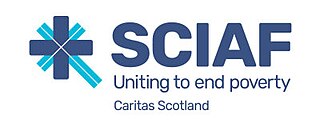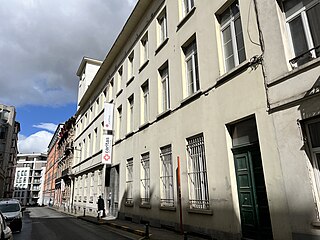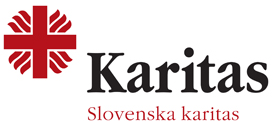
The Scottish Catholic International Aid Fund, better known by its acronym SCIAF, is the official aid and development agency of the Catholic Church in Scotland. Established in 1965, SCIAF now works in eight countries across Asia, Africa and Latin America and providing assistance to vulnerable people. SCIAF works with partner organisations and has responded to humanitarian disasters with emergency provisions and support. In Scotland, SCIAF raises awareness of the underlying causes of global poverty and injustice, work that includes visiting schools.

Caritas Europa is a European confederation of Catholic social service providers and international development and humanitarian relief organisations operating in Europe. It is one of the seven regions of Caritas Internationalis.

Ngô Đình Lệ Quyên, was a South Vietnamese-born Italian lawyer who served as Commissioner of Immigration for the city of Rome.

Caritas Internationalis is a confederation of 162 national Catholic relief, development and social service organisations operating in over 200 countries and territories worldwide. The name Caritas Internationalis refers to both the global network of Caritas organisations and to its general secretariat based in the Vatican City in Rome, Italy.
Robert Joseph Vitillo is the Secretary General of the International Catholic Migration Commission (ICMC). Prior to that, Vitillo has served in various high level functions in Catholic charitable agencies, including Caritas Internationalis and the Catholic Campaign for Human Development. A trained social worker, he is known for his broad expertise on human migration and refugee services, child protection, social services, human rights, HIV/AIDS and global health.
Caritas Austria is an Austrian social aid organisation of the Roman Catholic Church, founded in 1903. It consists of a national office and nine regional diocesan Caritas organisations, all of which are legally independent.
Caritas Switzerland is a Swiss Catholic not-for-profit organisation. Its mission is to prevent, combat and alleviate poverty.

Caritas Slovenia is a Slovenian Catholic charity organisation. It operates nationally by providing social welfare services, and internationally by supporting the relief and development efforts of partner organisations.

Caritas Syria is a Syrian Catholic charitable and humanitarian aid organisation.
Caritas Finland in English and Swedish or Suomen Caritas in Finnish is a Catholic aid organisation from Finland. It is part of the European network of Caritas organisations Caritas Europa, as well of the global Caritas Internationalis confederation.
Caritas Norway is a Catholic aid organisation from Norway. It is part of the European network of Caritas organisations Caritas Europa, as well of the global Caritas Internationalis confederation.

Armenian Caritas is a not-for-profit social welfare and humanitarian relief organisation based in Armenia. It is a service of the Armenian Catholic Church and a member of both Caritas Europa and Caritas Internationalis.
Caritas Albania is an Albanian Catholic not-for-profit social welfare and humanitarian relief organisation. It is a service of the Albanian Bishops' Conference.

Caritas Croatia, sometimes also translated as Croatian Caritas, is a Catholic not-for-profit social welfare and humanitarian relief organisation in Croatia. It is a service of the Episcopal Conference of Croatia.

Caritas Latvia is a Catholic not-for-profit social welfare organisation in Latvia. It is a service of the Episcopal Conference of Latvia.

Caritas Hellas is a not-for-profit social welfare and humanitarian organisation in Greece. It is a service of the Catholic Church in Greece and a member of both Caritas Europa and Caritas Internationalis.
Caritas Bulgaria or officially the National Catholic Federation Caritas - Bulgaria is a not-for-profit social welfare organisation in Bulgaria. It implements social activities in support of vulnerable people in society and is a service of the Bulgarian Catholic Church.

Caritas Aotearoa New Zealand is a not-for-profit social justice and humanitarian relief organisation in New Zealand.

Caritas Hungary is a not-for-profit social welfare organisation in Hungary. It is a service of the Catholic Church in Hungary.

Caritas Indonesia, also known as the Karina Foundation, is a not-for-profit humanitarian relief and development organisation in Indonesia. It is a service of the country's Catholic Church. Since its establishment, the organisation has been actively engaged in emergency response, disaster risk management, and strengthening community resilience in disaster-prone areas.













